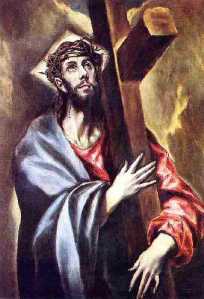Since Archbishop Wuerl wrote to us priests and asked us to make his points about Church teaching on abortion in our homilies this morning, I never got to give the homily I had prepared for today. So here it is—a “web exclusive.”
You duped me, O LORD, and I let myself be duped;
you were too strong for me, and you triumphed. Jeremiah 20:7
The prophet Jeremiah cries out his complaint to the Lord, and then resigns himself to his fate. At the time when Jeremiah was called to prophesy, the people of the kingdom of Judah had fallen so far into paganism that they had taken up the practice of sacrificing children to Baal. The Lord ordered Jeremiah to speak out and condemn this. Jeremiah was to prophesy that the people’s apostasy and evil would cause them to lose their homeland and be taken away in exile.
Jeremiah made his resigned complaint after the High Priest of the Temple struck him and ordered him put in the stocks because the prophet declared that doom would befall Jerusalem.
Jeremiah was not naturally inclined to make trouble; he was no grandstander. He would have preferred a quiet life. But the Lord compelled him to speak the truth and warn the people about the coming wrath. Even though obeying the divine summons cost him abuse, imprisonment, and exile, Jeremiah wistfully acknowledged to the Lord that he could not help but obey Him. There is nothing sweeter, in fact, than to suffer for the Lord by bearing unflinching witness to the divine truth of Revelation.
Then Jesus said to his disciples,“Whoever wishes to come after me must deny himself,
take up his cross, and follow me.” Matthew 16:24
This verse comes shortly after the verses we read at Holy Mass last week ( https://frmarkdwhite.wordpress.com/2008/08/21/caesarea-philippi/ ). When the Lord told them to take up their crosses, His disciples were still with Him at the foot of Mt. Hermon. As we recall, St. Peter had just declared the truth about Christ for the first time: You are the Son of God. You are divine. This is what has been revealed to us: Jesus of Nazareth is the eternal truth. He is the Lord of heaven Who compelled the prophets to speak. Christ is the Holy One of Israel for Whom Jeremiah freely chose to suffer.
So St. Peter had declared the Catholic faith for the first time ever. You might think the Lord Jesus would have patted him on the back, and then they might have spent some time basking in the moment.
Instead, Christ declared: I, the Almighty Master of all things, I will bend my neck beneath the yoke of suffering and give myself over into the hands of my enemies. I, the immortal One, will suffer and die. This is my destiny; this is my mission. And it is not to end in disaster, but in the triumph of life over death.
Let us try to put ourselves in the place of the disciples who first heard Christ tell them that in order to follow Him, they must take up their crosses. Now, two millennia later, we know that the cross is the symbol of the perfect sacrifice of atonement offered by the Son of God. We know that it is the symbol of our Redemption and eternal life.
For the original disciples, however, the cross was only a perverse instrument of torture used by their foreign overlords to make a public example of anyone who dared try to stand up against them. No fate could be worse, in the mind of any Jew, than to be condemned to crucifixion and be driven by Roman centurions through the streets with whips, dragging your hundred-twenty-five-pound cross along with you pathetically on your shoulder. Then you would spend two or three agonizing days hanging by your arms, with birds picking at you.
This is the metaphor that God incarnate used to describe what it was like to be His disciple. Even the prophet Jeremiah might have quailed at this.
The crucial phrase in the Lord Jesus’ words, however, is: “and follow me.” God Himself has walked the way of the cross ahead of us, and He has risen again from the dead. From heaven, He pours out His graces on us so that we can accept His invitation and become His disciples.
What are the crosses we have to take up in order to follow the Lord? Each of us has his or her own. Our crosses are formed by two beams. The one beam is reality and the truth: the law of God, the duties we have. The other beam is our own smallness, selfishness, weakness, and fear.
It would be easy to imitate the virtues of Christ if we weren’t sinners; it would be easy to be humble, gentle, kind, chaste, courageous, and unswervingly faithful and honest. Our crosses would be weightless if we weren’t so miserably inclined to run away from reality and the mission the Lord has given each of us to accomplish.
Let us resign ourselves like Jeremiah. Living in the truth is an agony of self-purification and self-denial. The truth makes demands of us. But what else are we going to do? God is God. His grace is sufficient; His grace will be our strength. If we lose our lives for His sake, we will find life. And when He comes again in glory, we will shine like the stars in the sky.
